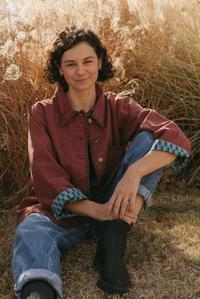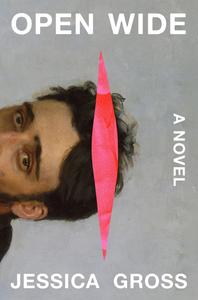
|
|
| Jessica Gross (photo: Macy Tapp) |
|
Shelf Awareness called Jessica Gross's first novel, Hysteria, "coolly sexy and razor-smart"; it has been optioned for TV development. Her nonfiction has appeared in the New York Times Magazine, Lilith, and the Los Angeles Review of Books, among other publications. She has taught writing at the New School and Texas Tech University, and lives in West Texas with her husband and her dog--she notes that "we all have the same hair." Her second novel, Open Wide (Abrams Press; reviewed in this issue), is thought-provoking, darkly funny, and a little terrifying, and has been optioned for film development.
Do you start with the imagery of splitting open, or a concept that you then look for a metaphor to fit?
More the latter. This book has taken me through a personal evolution. At the time I started working on it, I was a single woman living in New York in 2019. Then I met my now-husband and entered a serious relationship for the first time in a long time. I was grappling with the question of what it means to be with someone and maintain your separate personhood, and my own boundary issues and confusions. So it started with mining that difficult psychological terrain personally, and thinking, what can I do with this in a fictional world? And concretize it. So it started with the psychic part, and became the surreal body horror iteration.
Is that a matter of literalizing a universal impulse?
I've been very inspired by the writer Marie-Helene Bertino, who I've been privileged to know personally. Her work often does this kind of magical realist thing, and she's talked about it in ways that have influenced my own writing. Why not literally make the world magical, instead of it just feeling magical? That's been something I've had a lot of fun playing with in my own work. It's just taking a concept to its most extreme version. Often, when I'm revising, it helps me to print out the work. Then I can see it from a distance and in a new way, and cut it up and play around with it, literally, on the paper. It feels like a version of that. I'm going to play with this concept, but from a different angle, and see what happens. And it's often nothing good for the characters! It's easier to see their psychological ailments when you make them really concrete.
 Why do you suppose it's fun for us to write, and read, those uncomfortable extremes?
Why do you suppose it's fun for us to write, and read, those uncomfortable extremes?
When I taught at the New School, we were reading a story where the characters were completely going at it, and one of my more brilliant students said "Oh! In fiction the characters can do and say things that we're too scared to do and say in real life." And that was a great description of one thing that fiction can offer. This catharsis, being able to live through characters what we don't necessarily have the guts or ability to live through in our real life, is something that plays and novels have offered us since their inception. It's fun in the same way that reading a book set on the French Riveria while you're living in Lubbock is fun. You get to be transported to another world, another person, another psyche, and you get to play something out without any repercussions in your actual life or relationships. And maybe there's a bit of schadenfreude too, that this character is doing something damaging and, oh, what a relief. It's like waking up from a dream. Whew. None of that was real.
This is a very physical, embodied story. Is it fun to write that stuff, the guts? Is that a consistent interest or feature in your writing?
Yes. I like to root things in the body. I feel like it's a very effective way to involve the reader in the story, simulate for the reader what's happening in the story. In my first book, there was a lot of sexual body stuff--which there is some of in this book. But the body horror elements--it's funny, because I don't like reading or watching horror. It's not a genre I'm interested in as much. But doing it myself is obviously very different, because I have total control over the gruesomeness. So it was extremely pleasurable! On the couple of occasions when I forced myself to watch videos of doctors performing surgeries, I was really disgusted. I was then having to search "doctor explaining surgery on human model," because I just couldn't handle the actual gore. But it was extremely fun and pleasurable to be able to write about the body in such a visceral way. In this novel, also, I tried something new to me, which was making it very focused on sound. And that's tough--trying to get anything sensory on the page is a fun challenge, and a way for the story to subsume the reader from different angles that aren't just intellectual.
What relationship does Open Wide have with Hysteria? Are they in conversation?
They definitely are. One is not an extension of the other--it's not a sequel--but the narrators of both happen to be a little off their rockers, have psychological struggles that they're working through. They're both deep first person. The first one even more--it takes place over about 48 hours, so it's very much about living the narrator's life, and incredibly embedded in her psyche. With this one, I wanted a tiny bit more distance, and it takes place over a longer period of time, so it's not quite as immersive. But they have that stylistic thing in common, and the surrealism. The first one was also surreal; in both of them I'm playing with reality. What's really happening? And as you noticed, concretizing something that could have just been a metaphor. They have a lot in common, but with different characters and different challenges I set myself from a craft perspective.
What makes Olive so compelling as a protagonist?
Well, it is not a foregone conclusion that someone else would find her compelling! To me, she's strange in a way that I really enjoy. I feel like she's very observant, and she's funny, and just bizarre and messed up in a way that I like. I'm not drawn as much to characters that have everything figured out. I'd rather they be working through something kind of messy, and a little bit spilling all over the place. I'm drawn to people who are working through it, working on their psyches, and willing to let you in. I tend to start with something I'm grappling with my own life and then turn up the volume by 400%. For fun. For exploration. --Julia Kastner, blogger at pagesofjulia

